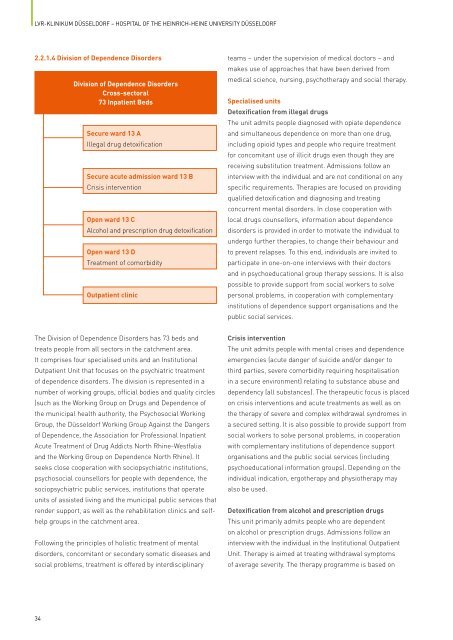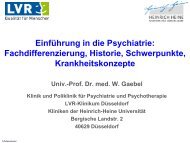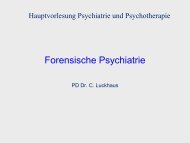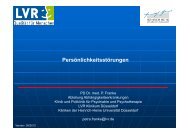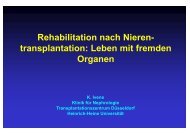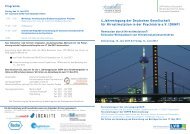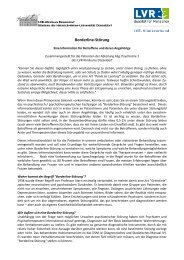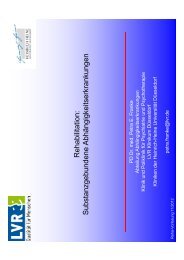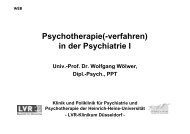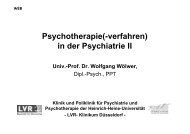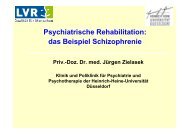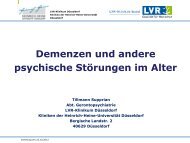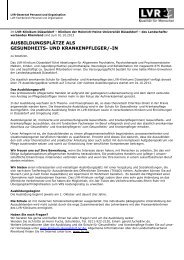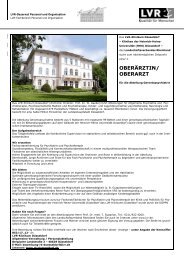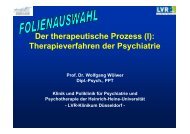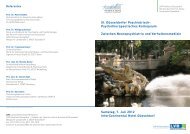LVR-Klinikum Düsseldorf Hospital of the Heinrich-Heine University ...
LVR-Klinikum Düsseldorf Hospital of the Heinrich-Heine University ...
LVR-Klinikum Düsseldorf Hospital of the Heinrich-Heine University ...
Create successful ePaper yourself
Turn your PDF publications into a flip-book with our unique Google optimized e-Paper software.
lVr-KlINIKUM DÜSSelDOrF – HOSPItal OF tHe HeINrIcH-HeINe UNIVerSItY DÜSSelDOrF<br />
2.2.1.4 Division <strong>of</strong> Dependence Disorders<br />
The Division <strong>of</strong> Dependence Disorders has 73 beds and<br />
treats people from all sectors in <strong>the</strong> catchment area.<br />
It comprises four specialised units and an Institutional<br />
Outpatient Unit that focuses on <strong>the</strong> psychiatric treatment<br />
<strong>of</strong> dependence disorders. The division is represented in a<br />
number <strong>of</strong> working groups, <strong>of</strong>ficial bodies and quality circles<br />
(such as <strong>the</strong> Working Group on Drugs and Dependence <strong>of</strong><br />
<strong>the</strong> municipal health authority, <strong>the</strong> Psychosocial Working<br />
Group, <strong>the</strong> <strong>Düsseldorf</strong> Working Group Against <strong>the</strong> Dangers<br />
<strong>of</strong> Dependence, <strong>the</strong> Association for Pr<strong>of</strong>essional Inpatient<br />
Acute Treatment <strong>of</strong> Drug Addicts North Rhine-Westfalia<br />
and <strong>the</strong> Working Group on Dependence North Rhine). It<br />
seeks close cooperation with sociopsychiatric institutions,<br />
psychosocial counsellors for people with dependence, <strong>the</strong><br />
sociopsychiatric public services, institutions that operate<br />
units <strong>of</strong> assisted living and <strong>the</strong> municipal public services that<br />
render support, as well as <strong>the</strong> rehabilitation clinics and selfhelp<br />
groups in <strong>the</strong> catchment area.<br />
Following <strong>the</strong> principles <strong>of</strong> holistic treatment <strong>of</strong> mental<br />
disorders, concomitant or secondary somatic diseases and<br />
social problems, treatment is <strong>of</strong>fered by interdisciplinary<br />
34<br />
Division <strong>of</strong> Dependence Disorders<br />
Cross-sectoral<br />
73 Inpatient Beds<br />
Secure ward 13 A<br />
Illegal drug detoxification<br />
Secure acute admission ward 13 B<br />
Crisis intervention<br />
Open ward 13 C<br />
Alcohol and prescription drug detoxification<br />
Open ward 13 D<br />
Treatment <strong>of</strong> comorbidity<br />
Outpatient clinic<br />
teams – under <strong>the</strong> supervision <strong>of</strong> medical doctors – and<br />
makes use <strong>of</strong> approaches that have been derived from<br />
medical science, nursing, psycho<strong>the</strong>rapy and social <strong>the</strong>rapy.<br />
Specialised units<br />
Detoxification from illegal drugs<br />
The unit admits people diagnosed with opiate dependence<br />
and simultaneous dependence on more than one drug,<br />
including opioid types and people who require treatment<br />
for concomitant use <strong>of</strong> illicit drugs even though <strong>the</strong>y are<br />
receiving substitution treatment. Admissions follow an<br />
interview with <strong>the</strong> individual and are not conditional on any<br />
specific requirements. Therapies are focused on providing<br />
qualified detoxification and diagnosing and treating<br />
concurrent mental disorders. In close cooperation with<br />
local drugs counsellors, information about dependence<br />
disorders is provided in order to motivate <strong>the</strong> individual to<br />
undergo fur<strong>the</strong>r <strong>the</strong>rapies, to change <strong>the</strong>ir behaviour and<br />
to prevent relapses. To this end, individuals are invited to<br />
participate in one-on-one interviews with <strong>the</strong>ir doctors<br />
and in psychoeducational group <strong>the</strong>rapy sessions. It is also<br />
possible to provide support from social workers to solve<br />
personal problems, in cooperation with complementary<br />
institutions <strong>of</strong> dependence support organisations and <strong>the</strong><br />
public social services.<br />
Crisis intervention<br />
The unit admits people with mental crises and dependence<br />
emergencies (acute danger <strong>of</strong> suicide and/or danger to<br />
third parties, severe comorbidity requiring hospitalisation<br />
in a secure environment) relating to substance abuse and<br />
dependency (all substances). The <strong>the</strong>rapeutic focus is placed<br />
on crisis interventions and acute treatments as well as on<br />
<strong>the</strong> <strong>the</strong>rapy <strong>of</strong> severe and complex withdrawal syndromes in<br />
a secured setting. It is also possible to provide support from<br />
social workers to solve personal problems, in cooperation<br />
with complementary institutions <strong>of</strong> dependence support<br />
organisations and <strong>the</strong> public social services (including<br />
psychoeducational information groups). Depending on <strong>the</strong><br />
individual indication, ergo<strong>the</strong>rapy and physio<strong>the</strong>rapy may<br />
also be used.<br />
Detoxification from alcohol and prescription drugs<br />
This unit primarily admits people who are dependent<br />
on alcohol or prescription drugs. Admissions follow an<br />
interview with <strong>the</strong> individual in <strong>the</strong> Institutional Outpatient<br />
Unit. Therapy is aimed at treating withdrawal symptoms<br />
<strong>of</strong> average severity. The <strong>the</strong>rapy programme is based on


